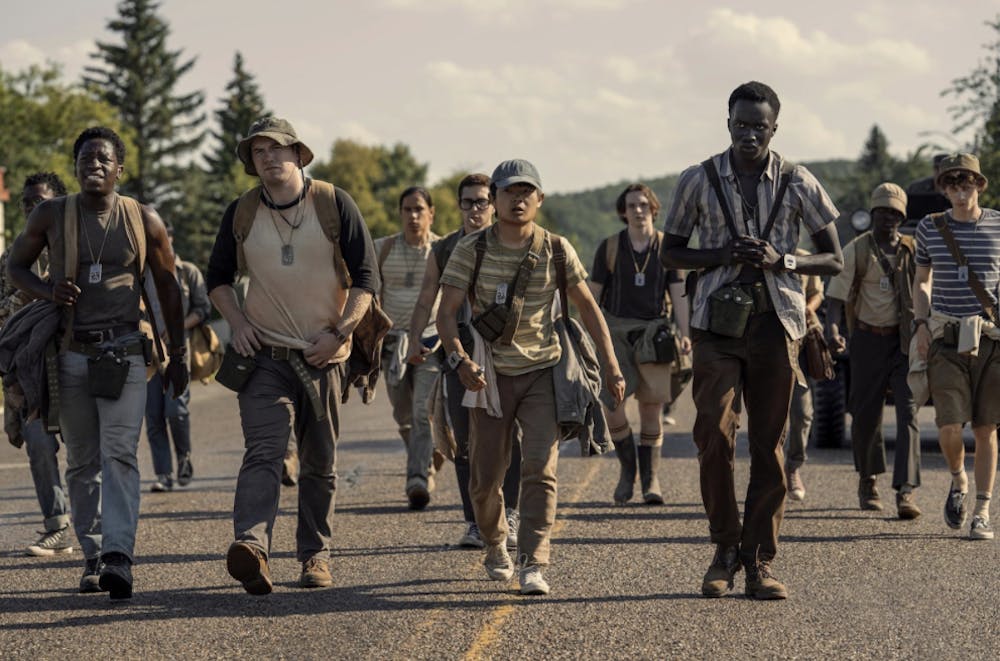By Michael McKee
Correspondant
With the year coming to an end and critically acclaimed films such as “Sinners”, "Caught Stealing” and “One Battle After Another” gaining attention as shoe-ins for Oscar nominations and possibly even wins, there is one film that has sadly gone under the radar. That film is “The Long Walk,” which was released on Sept. 12 and directed by Francis Lawrence, adapting the 1979 Stephen King novel of the same name.
The story is set in a post-civil war America in the midst of an economic depression and concerns a deadly contest where a group of boys and young men must continue walking above the speed of three mph or risk getting shot. The walk continues until there is one winner who will get endless riches and one wish.
The main heart of the film is its characters, specifically its main characters, The Four Musketeers, including the beleaguered mama’s boy and protagonist Ray Garraty, played by Cooper Hoffman, the upbeat and optimistic Pete McVries, played by David Jonsson, the religious and loyal Art Baker, played by Tut Nyuot and the neurotic but determined oddball Hank Olsen, played by Ben Wang. The brotherhood that these characters develop and share serves as a bittersweet and powerful contrast to their horrific situation.
The other characters stuck in this hopeless death march are the imposing Billy Stebbins, the disturbed Gary Barkovitch, the defiant Collie Parker, and aspiring author Richard Harkness. These contestants are humanized, and given depth through the actors' excellent portrayals, which makes the audience empathize with them and makes their inevitable deaths all the more painful.
The walk is overseen by The Major, who is played by the legendary Mark Hamill, with the aloof gruffness of a drill sergeant. Overall, every actor delivers an amazing performance worthy of widespread acclaim and recognition.
Also of note is the film’s direction. Director Francis Lawrence had previously worked on post-apocalyptic dramas such as “I Am Legend” and most of “The Hunger Games” franchise. The running theme throughout Lawrence’s work is how close bonds can get people through hopeless situations such as the bond between Robert Neville and his dog Samantha in “I Am Legend” and the various tributes in “The Hunger Games” franchise which makes him a great choice for this film.
The tone Lawrence establishes as well as his creative choices creates an oppressive atmosphere that digs into the audience. The decision to show most of the executions in close brutal detail is haunting and establishes the stakes of the deadly competition.
At the same time Lawrence also imbues his story with warmth and is able to endear us to the walkers with a focus on their interpersonal bonds, banter, personalities and backstories. This balancing act definitely pays off in creating a story filled with tragic complexity.
Any analysis of this film would be incomplete without mentioning the excellent score by Jeremiah Fraites which is haunting and powerful. Especially notable is the theme for Olsen which stays with the viewer long after they leave the theater.
While there is much to praise about the film many book readers felt disappointed by the film’s changes to story and characters, including cut characters such as Scramm and the Hopi twins and a different and somewhat vague ending. Putting these changes aside, the film still works on its own and is accessible to newcomers.
If I were to pick which Academy Awards this film should be nominated for, I would choose Cooper Hoffman for Best Actor, David Jonsson and Ben Wang for Best Supporting Actor, Francis Lawrence for Best Director, JT Mollner for Best Adapted Screenplay, Jeremiah Fraites for Best Original Score, and of course “The Long Walk” for Best Picture.
With all of this in mind, it is clear that “The Long Walk” is a film that deserves widespread acclaim and should be remembered as one of the year’s best films for decades to come.







